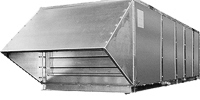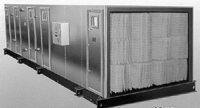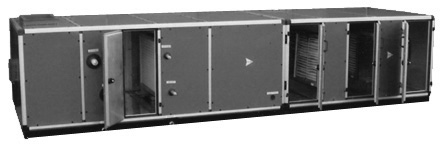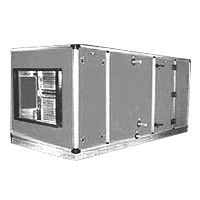Air-Handling Units
A make-up air unit provides replacement air. The purpose of a make-up air unit is to replace the air exhausted from a space by general ventilation, process equipment, heaters, and other HVAC equipment. By replacing the air, the building is brought to a neutral or predetermined building pressure.
Custom Packaged air-handling units:
steam AHU
gas-fired, indirect and direct AHU
condensing AHU
refridgerant AHU
multi-zone ad mixed-flow AHU


for all types of industrial and commercial applications:
- Aerospace
- Automotive
- Chemical
- Clean Rooms
- Food Processing
- Hospitals
- Marine
- Pharmaceutical
- Semiconductor
- Schools
LONG SERVICE LIFE:
We use premium quality industrial-grade materials and additional protective coatings for external surfaces and internal components of our Air Handling Units - to withstand the specific gases flow and the installation conditions of each application, industrial and commercial / institutional.CAPACITIES:
Up to 100,000 CFM for standard construction and larger, custom made on special request.FLEXIBILITY:
Every unit is designed for the specific installation and connections conditions. The unit floor area and its cross section dimensions are adjusted for precise room available at site.EASY INSTALLATION:
Packaged compact or sectional design provided with lifting arrangement and protections for easy transportation and handling / installation at site.LOW MAINTENANCE:
Service friendly design which provide large room inside cabinet, access doors, light and rigid floor ensuring accessibility to all components.HIGH EFFICIENCY:
Fans, coils, motors, humidifiers, filters, external insulation material, silencers, enclosure tightness, and other components are carefully selected and engineered for lowest energy consumption.OPERATIONALLY SAFE:
Safety devices and guards are provided in accordance to the international regulations and the customer specific requirements.PRECISE PERFORMANCE:
to match the customer capacities requirement utilizing the computerized selection for each component.

DIRECT AND INDIRECT GAS-FIRED AHUs
Canada Blower makes two primary gas-fired AHU types: direct gas-fired and indirect gas-fired.
DIRECT GAS-FIRED AHU
A direct gas-fired AHU has a gas burner installed directly in the outside makeup-air stream. The products of combustion (carbon dioxide [CO2], carbon monoxide [CO], nitrogen dioxide [NO2]) are discharged directly into the makeup air stream and supplied to the building area.INDIRECT GAS-FIRED AHU
An indirect gas-fired AHU has a sealed combustion chamber where all products of combustion are discharged through a flue to the outside environment and no products of combustion are discharged within the make-up air supplied to the building. Such equipment also frequently is utilized for recirculating-air applications.DIRECT-GAS-FIRED-AHU COMPONENTS
Though simple in principle of operation, direct gas-fired AHUs have sophisticated burner-control systems. Unit sizes range from 1,000 cfm with a heating capacity of 80,000 Btuh to 100,000 cfm with a heating capacity of 15 million Btuh. Direct-gas-fired-AHU components usually include housings, supply fans, outside air intake hoods, intake dampers, filters and burners.AHU HOUSINGS
AHU housings are made of galvanized or aluminized steel. Access panels are provided to access dampers, filters, burners, and fans / motors. AHUs located outside are provided with a sloped roof and standing seam joints.SUPPLY FANS
Fans typically are double-width double-inlet (DWDI) with forward-curved or backward-inclined blades. Fans can come with open drip-proof (ODP) or totally enclosed fan cooled (TEFC) motors. The most typical external static pressure in the 2- to 3-in.-wg range. Because most outside istalled air handling units can operate below 0°F, fan motors and bearings are rated to handle lower temperatures. For applications that require supply-air temperatures higher than 110°F, the motors and fan bearings are rated for maximum design operating temperatures when placed in draw-through configurations.INTAKE DAMPERS AND HOODS
Outside air intake hoods or weather hoods are designed for an installation specific location and usually provided with bird screens. Outside-air intake isolation dampers are furnished to prevent cold air from dropping through a unit into a warm building and warm air from escaping through a unit during winter months, when it is not in operation. Low-leakage parallel blade isolation dampers are most standard. The fan discharge is located at the opposite to isolation-damper position.FILTERS
A filter cabinet normally has 30/30 filters in a V-bank configuration to increase filter area and reduce static-pressure drop across the filters. Higher-efficiency filters are used on application.BURNERS
A burner consists of a cast-iron or aluminum pipe assembly with drilled gas orifices. The fuel-air mixing is controlled by perforated stainless-steel baffles attached to the pipe assembly. The burner can be placed in the outside airstream or in the outside / return mixed-air stream. But to prevent potentially hazardous combustion byproducts of indoor-air contaminants, the burner is placed in the outside airstream only. The required airflow across the burner must be within a specific velocity range (typically 2,500 to 3,500 fpm) for proper combustion. For variable airflow units, a modulating bypass damper or profile plate maintains the airflow velocity within the specified velocity range. Otherwise, the burner can experience inefficient operation, generate odors in the occupied spaces served, and create an un-safe increase in certain products of combustion.For competitive quotations click here:
Liquid-to-Air Heat Exchangers
Air-to-Air Heat Exchangers
Air Handling Units
Canada
Blower Co. produces different types of gas-fired air makeup units for
industrial building ventilation.
Industrial and commercial heating, ventilation and air-conditioning
(HVAC) equipment, high pressure blowers, industrial fans and
ventilators, high temperature oven fans and blowers, centrifugal and
axial blowers and fans. We offer SST stainless steel packaged fan,
blowers, ventilators and custom industrial ventilating equipment.
Centrifugal and vaneaxial air handling Chicago Blower, Canada fans;
belt and direct drive; single-width and double-width blowers; Buffalo
Blower, New York airfoil; BI; radial; General Industrial; Pressure
Blowers
Suppliers
of industrial regenerative side channel blowers, forward curved
pressure blowers and fans in stainless steel, alloy, cast aluminium,
cast iron,
polypropylene and FRP construction. Canadian Blower, Chicago supplies
replacement forward curved blowers and wheels for forward curved
blowers and
fans manufactured by Buffalo Blower - New York, Twin City Fan, Northern
Blower,
Chicago Blower, Sheldons, Cincinnati Fan, Hartzell, IAP, Industrial air
products,
Canadian blower, Aerovent, Penn Ventilation, Penn-Barry, Barry Blower,
ACME,
Aerovent, Alphair, American Fan, Lau Industries, Clarage, Delhi,
Canarm, Leader
Fan, Daltec, ABB, Flakt, Flaktwoods, Woods, MK Plastics, Robinson
Industrial,
Garden City Fan, Loren Cook, Jen-air, Jenn Fan, Aeroflo, Grainger,
Greenheck,
Kice Fan, ILG Industries, Canada Fan, Industrial Air, Ceilcote,
Breidert,
Anderson 2000, Solar and Palau, Strobic air, Trane, TCF Axial.
Engineers and designers of
industrial process and OEM blowers, fans and ventilators, such as high
temperature fans, high pressure blowers and high volume ventilators,
stainless and other special alloy construction, spark-resistant
explosion proof blowers. Sales of centrifugal blowers and axial flow
fans, blowers and ventilators.
industrial,process,blower,fan,ventilator,pressure,high,centrifugal,axial,inline,explosion
proof,spark-resistant,high temperature,Garden City,TCF,Twin
City,Northern,ILG,Industrial Air Products,Gas Engineering,American
Coolair,ILG,IAP
